Caryn
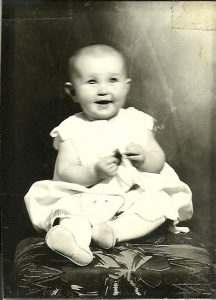 Today would have been my mother-in-law, Joann Schulenberg’s 89th birthday, but she went home to Heaven just over two years ago. She was born second of her parents’ 4 children. Her older brother Everett Knox passed away shortly after birth, due to a complicated birth, and the lack of medical assistance. The baby should have been taken by Caesarian section, but he was born at home and the doctor did not think the C-section was necessary…sadly. When grandma, Nettie Knox found out that she was pregnant again, she made up her mind not to take any chances with this Rainbow Baby. Grandma decided that she would go stay in the hospital for the last month of her pregnancy, until her baby arrived. She paid $5.00 a day for the privilege, and she would stay there for 40 days by the time her baby, my future mother-in-law was born.
Today would have been my mother-in-law, Joann Schulenberg’s 89th birthday, but she went home to Heaven just over two years ago. She was born second of her parents’ 4 children. Her older brother Everett Knox passed away shortly after birth, due to a complicated birth, and the lack of medical assistance. The baby should have been taken by Caesarian section, but he was born at home and the doctor did not think the C-section was necessary…sadly. When grandma, Nettie Knox found out that she was pregnant again, she made up her mind not to take any chances with this Rainbow Baby. Grandma decided that she would go stay in the hospital for the last month of her pregnancy, until her baby arrived. She paid $5.00 a day for the privilege, and she would stay there for 40 days by the time her baby, my future mother-in-law was born.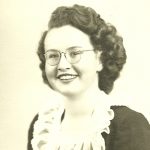
I’m sure lots of people though her solution was extreme, but she did what she felt was prudent for the times. She never wanted to deliver another baby, so far from emergency medical services. As it turned out, her three daughters were born without incident. Nevertheless, her daughters were all born in a hospital. She wasn’t taking any chances.
My mother-in-law may not have had a rough beginning, but she would, nevertheless, remain an only child 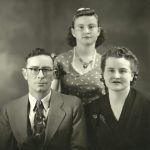 almost 15 years, before her sister, Linda joined the family. Margee would follow just over two years later. Many things have changed in the years since my mother-in-law was born. Home births have become less common, but they are making a comeback these days. Babies dying in childbirth are more rare now, but it doesn’t mean that it’s impossible. I think that if all that happened to Grandma Knox today, she would still react to it in the same way as she did then. Today would have been my mother-in-law’s 89th birthday. I’m thankful that she lived all those years ago, because if she hadn’t, my life would have been much different. Happy birthday in Heaven, Mom. We love and miss you very much.
almost 15 years, before her sister, Linda joined the family. Margee would follow just over two years later. Many things have changed in the years since my mother-in-law was born. Home births have become less common, but they are making a comeback these days. Babies dying in childbirth are more rare now, but it doesn’t mean that it’s impossible. I think that if all that happened to Grandma Knox today, she would still react to it in the same way as she did then. Today would have been my mother-in-law’s 89th birthday. I’m thankful that she lived all those years ago, because if she hadn’t, my life would have been much different. Happy birthday in Heaven, Mom. We love and miss you very much.
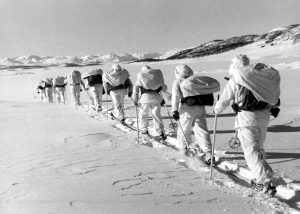 Nine parachutes floated silently to the Earth on a calm February 27, 1943. Their mission was to blow up a Nazi-controlled heavy water plant in Vemork, Norway. The men had been specially trained by British Special Operations, and they had been chosen to carry out this vital mission. Heavy water was a crucial element in the production of plutonium, an ingredient for the nuclear bomb Hitler’s scientists were feverishly attempting to build. The plant at Vemork was the only such facility in the world.
Nine parachutes floated silently to the Earth on a calm February 27, 1943. Their mission was to blow up a Nazi-controlled heavy water plant in Vemork, Norway. The men had been specially trained by British Special Operations, and they had been chosen to carry out this vital mission. Heavy water was a crucial element in the production of plutonium, an ingredient for the nuclear bomb Hitler’s scientists were feverishly attempting to build. The plant at Vemork was the only such facility in the world.
The plant at Vemork was heavily fortified, and it remoteness made it impervious to bombing. It could only be destroyed on site, and for the men, parachuting in was just the beginning of the mission. The men would also be required to scale a 500-foot-high cliff in the dead of winter, and infiltrate a heavily guarded basement laboratory. The nine Norwegians, led by 23 year old Joachim Ronneborg, did just that, successfully detonating  explosives that shut down the facility. The destruction of the Vemork plant was crucial in Albert Speer’s decision to halt attempts to produce a Nazi atomic weapon.
explosives that shut down the facility. The destruction of the Vemork plant was crucial in Albert Speer’s decision to halt attempts to produce a Nazi atomic weapon.
The United States began early nuclear research first, but Germany was moving forward with its own nuclear energy research and atomic bomb program. In April 1939, Germany began a secret program called the Uranverein or “Uranium Club.” The German program recruited some of the top scientific minds in Germany, including recent Nobel Prize winner Werner Heisenberg. It was led by physicist Kurt Diebner. The Uranium Club was getting dangerously close to making an atomic weapon, and it had to be stopped. Hitler could not win this one.
Had nine Norwegian soldiers not trekked into the cold on that day in February 1943, it is hard to say how much 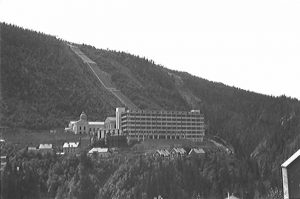 longer the war might have lasted, or how much destruction might have been carried out. Their brave and selfless act saved many lives to be sure. At the very least, Operation Gunnerside should be recognized as one of the most successful SOE missions during World War II. Ronneborg and his squad fully expected this mission to be a one-way trip. It never occurred to them that they might survive. Nevertheless, the operation brought with it zero casualties, and temporarily destroyed the Germans’ single source of heavy water at the time. Ronneborg later commented that “London could have suffered a different fate and ended up ‘looking like Hiroshima’ if his team had failed.”
longer the war might have lasted, or how much destruction might have been carried out. Their brave and selfless act saved many lives to be sure. At the very least, Operation Gunnerside should be recognized as one of the most successful SOE missions during World War II. Ronneborg and his squad fully expected this mission to be a one-way trip. It never occurred to them that they might survive. Nevertheless, the operation brought with it zero casualties, and temporarily destroyed the Germans’ single source of heavy water at the time. Ronneborg later commented that “London could have suffered a different fate and ended up ‘looking like Hiroshima’ if his team had failed.”

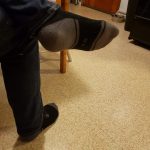 Whether you are a die-hard football fan, or you just like to bet once in a while, many people find themselves in some kind of bet over the Super Bowl. Most bets are innocent enough, with everyone laying their money down to see if they can pick the winner, point spread, or just the right square on a grid. Lots of people even bet on the games leading up to the Super Bowl, to keep the fun going all season long. Normally the whole idea is to see who can come up with the most money won, but every once in a while, a bet takes place that has nothing to do with money, and in this case, that has made all the difference.
Whether you are a die-hard football fan, or you just like to bet once in a while, many people find themselves in some kind of bet over the Super Bowl. Most bets are innocent enough, with everyone laying their money down to see if they can pick the winner, point spread, or just the right square on a grid. Lots of people even bet on the games leading up to the Super Bowl, to keep the fun going all season long. Normally the whole idea is to see who can come up with the most money won, but every once in a while, a bet takes place that has nothing to do with money, and in this case, that has made all the difference.
Mike and Ashley are two college students who have jumped on the tickle torture bandwagon. They read some of my tickle torture stories and the comments that followed, and Ashley decided that she wanted to “get” Mike when he could not defend himself. She solicited some assistance from her girlfriends, and one day, when Mike was taking a nap on her couch, he awoke to find that he was tied down, and his socks were being removed. He tried to fight the girls off, but they had him tied down tight. Thus began a series of bets to see who had to allow themselves to be tickle tortured. The ultimate winner was to win the torture session of a lifetime when the loser was tied down for the duration of the game.
The bet started out simple enough…between just the two of them, but it seems that Mike has made some “tickle enemies” over the years. That’s what happens when you have been the torturer to beat all torturers. Mike’s friends, cousins, parents, and even aunts and uncles wanted in on the fun. In the end, it was decided that there was to be one loser, and many winners. The tickle ideas began to run wild. Things like using a ball point pen to record the score changes on the bottoms of the loser’s feet, with a mandatory “scrubbing” of the  feet to remove the old score changes…feathers between the toes, hair brushes, and a multitude of other tickle tools to round out the fun.
feet to remove the old score changes…feathers between the toes, hair brushes, and a multitude of other tickle tools to round out the fun.
Unfortunately for Mike, he made so real poor team picks when it came to each week’s winning team picks. He lost to everyone, including nieces and nephews, aunts and uncles, his parents, and all the girls. His goose was cooked…so to speak. When the Super Bowl rolled around, lots of plans had been made for our loser. Leading up to the torture session were plenty of pictures of stocking feet that would “not” be tickled in the days events. Everyone was in on this…and nobody was missing this Super Bowl Party.
On that fateful day, Mike had to allow himself to be restrained. The group had decided to wrap him up like a burrito so that he couldn’t move. The torture devises were put on display for Mike to get a good look at. He had thought to try keeping his socks on to protect his feet as much as possible, but you can’t keep your socks on when you are tied up like a burrito. You have no say. Of course, Mike was to be allowed breaks, but then his dad came up with the idea of making him win a bet in order to get his break. Things were not looking good for the guy who hadn’t won a week’s bets all season, and to top it off, Mike comes from a fun-loving tickle family. He was doomed. Everyone had their own ideas of the torture they would mete out…and since Mike was in his cocoon in the middle of the room, it was open season. There was even a finale that he had no idea was coming.
If you watched the Super Bowl, you have a good idea just how many score changes there were, and remember that the score changed for the touchdown, and for the conversion point. Mike said there were something like 12 score changes…and he would know. Mike had tortured all these people, and now it was payback time. Mike said that the worst part was the scrubbing off of the old score for the changes. That tickled worse than anything 
 else. Mike told me that his feet were still feeling the tickle days later. He had never laughed so hard in his life. In fact he’s still recovering. He will never live this down. And as to the finale, well…it seems that at one time, Mike decided to prank his cousin by smashing a pie in her face. She has been waiting to just the right time to get even for that one, and so there was a cream pie just for the occasion. I wish I could have seen that one. Unfortunately, everyone was having so much fun, that the pictures were few, and far between. Nevertheless, the Super Bowl Tickle Torture was a grand success.
else. Mike told me that his feet were still feeling the tickle days later. He had never laughed so hard in his life. In fact he’s still recovering. He will never live this down. And as to the finale, well…it seems that at one time, Mike decided to prank his cousin by smashing a pie in her face. She has been waiting to just the right time to get even for that one, and so there was a cream pie just for the occasion. I wish I could have seen that one. Unfortunately, everyone was having so much fun, that the pictures were few, and far between. Nevertheless, the Super Bowl Tickle Torture was a grand success.
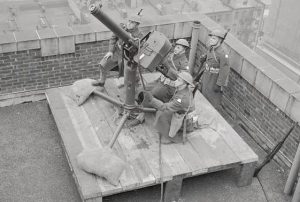 When the Japanese attacked Pearl Harbor, everything changed in an instant. Prior to December 7, 1941, no one had guessed that the Japanese planes could actually sneak up on a place as big as Pearl Harbor…much less 353 Imperial Japanese aircraft (including fighters, level and dive bombers, and torpedo bombers) in two waves, launched from six aircraft carriers. All in all, it was enough to cause a nation to be a little freaked out…to say the least.
When the Japanese attacked Pearl Harbor, everything changed in an instant. Prior to December 7, 1941, no one had guessed that the Japanese planes could actually sneak up on a place as big as Pearl Harbor…much less 353 Imperial Japanese aircraft (including fighters, level and dive bombers, and torpedo bombers) in two waves, launched from six aircraft carriers. All in all, it was enough to cause a nation to be a little freaked out…to say the least.
In the frantic weeks that followed the Pearl Harbor attack, the United States began to look at everything differently. Japanese-Americans were no longer trusted as loyal. Planes coming in to our coasts were feared…even when we knew who they were. Many Americans believed that enemy raids on the continental United States were imminent. Then, on December 9, 1941, everything came to a head when unsubstantiated reports of approaching aircraft caused a minor invasion panic in New York City that sent stock prices falling. On the West Coast, inexperienced pilots and radar men mistook fishing boats, logs, and even whales for Japanese warships and submarines. People were seeing the enemy everywhere, and everyone was tense. After US Secretary of War Henry Stimson warned that American cities should be prepared to accept “occasional blows” from enemy forces, the mood changed. Nobody was feeling okay with enemy blows, occasional or otherwise.
Then, on February 23, 1942, a Japanese submarine surfaced off the coast of Santa Barbara, California, shooting over a dozen artillery shells at an oil field and refinery. No one died in the attack, and the coast received only minor damage, but the attack marked the first time that the mainland United States had been bombed during World War II. The day after the oil field attack, people were still paranoid, and the raw nerves brought itchy trigger fingers. The events of that day aligned to produce one of the most shocking home front incidents of the war. It began on the evening of February 24, 1942, when naval intelligence instructed units on the California coast to steel themselves for a potential Japanese attack. For the next few hours, they military calmly prepared for what they perceived inevitable attack. Shortly after 2am on February 25, military radar picked up what appeared to be an enemy contact some 120 miles west of Los Angeles. Air raid sirens sounded and a citywide blackout was put into effect. Within minutes, the troops manned anti-aircraft guns and began sweeping the skies with searchlights.
Just after 3am the shooting started, triggered by reports of an unidentified object in the skies. The troops in Santa Monica unleashed a hail of anti-aircraft and .50 caliber machine gun fire. Before long, many of the city’s other coastal defense weapons had joined in. The Los Angeles Times wrote, “Powerful searchlights from countless stations stabbed the sky with brilliant probing fingers, while anti-aircraft batteries dotted the heavens with beautiful, if sinister, orange bursts of shrapnel.” The entire scene was so chaotic over the next several 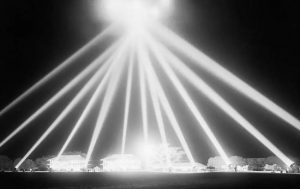 minutes, that it appeared Los Angeles was indeed under attack. Still, many of those who looked skyward saw nothing, but smoke and the glare of ack-ack fire. “Imagination could have easily disclosed many shapes in the sky in the midst of that weird symphony of noise and color,” Coastal Artillery Corps Colonel John G. Murphy later wrote. “But cold detachment disclosed no planes of any type in the sky…friendly or enemy.”
minutes, that it appeared Los Angeles was indeed under attack. Still, many of those who looked skyward saw nothing, but smoke and the glare of ack-ack fire. “Imagination could have easily disclosed many shapes in the sky in the midst of that weird symphony of noise and color,” Coastal Artillery Corps Colonel John G. Murphy later wrote. “But cold detachment disclosed no planes of any type in the sky…friendly or enemy.”
Still, for many others along the coast, the threat appeared to be very real. From across the city reports poured in describing Japanese aircraft flying in formation, as well as paratroopers. There was even a claim of a Japanese plane crash landing in the streets of Hollywood. “I could barely see the planes, but they were up there all right,” a coastal artilleryman named Charles Patrick later wrote in a letter. “I could see six planes, and shells were bursting all around them. Naturally, all of us fellows were anxious to get our two-cents’ worth in and, when the command came, everybody cheered like a son of a gun.” The barrage continued for over an hour, and by the time a final “all-clear” order was given later that morning, Los Angeles’ artillery batteries had pumped over 1,400 rounds of anti-aircraft ammunition into the sky.
It was only in the light of day that the American military units made a puzzling discovery: there appeared to have been no enemy attack. “Although reports were conflicting and every effort is being made to ascertain the facts, it is clear that no bombs were dropped and no planes were shot down,” read a statement from the Army’s Western Defense Command. The counter-attack was, in reality, the whole attack. The only damage during the “battle” had come from friendly fire. Anti-aircraft shrapnel rained down across the city, shattering windows and ripping through buildings. One dud landed in a Long Beach golf course, and several residents had their homes partially destroyed by 3-inch artillery shells. There were no serious injuries from the shootout, but it was reported that at least five people had died as a result of heart attacks and car accidents that occurred during the extended blackout. In a preview of the hysteria that would soon accompany the Japanese internment, authorities also arrested some 20 Japanese-Americans for allegedly trying to signal the nonexistent aircraft.
Over the next few days, government and media outlets issued contradictory reports on what later became known as the “Battle of Los Angeles.” Secretary of the Navy Frank Knox dismissed the firefight as a false alarm brought on by “jittery nerves,” but Secretary of War Henry Stimson echoed Army brass in saying that at least 15 planes had buzzed the city. He even advanced the provocative theory that the phantom fighters might have been commercial aircraft “operated by enemy agents” hoping to strike fear into the public. Stimson later backpedaled his claims, but there was still the matter of the thousands of military personnel and civilians who 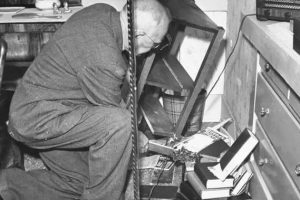 claimed to have seen aircraft in the skies over Los Angeles. According to an editorial in the New York Times, some eyewitnesses had spied “a big floating object resembling a balloon,” while others had spotted anywhere from one plane to several dozen. “The more the whole incident of the early morning of February 25 in the Los Angeles district is examined,” the article read, “the more incredible it becomes.” Politics had stepped in to put its spin on matters, and I suppose that with all that, the truth might never be known…other than no plane was found crashed in Hollywood. In reality, the whole “battle” was brought about by anxious nerves and itchy trigger fingers.
claimed to have seen aircraft in the skies over Los Angeles. According to an editorial in the New York Times, some eyewitnesses had spied “a big floating object resembling a balloon,” while others had spotted anywhere from one plane to several dozen. “The more the whole incident of the early morning of February 25 in the Los Angeles district is examined,” the article read, “the more incredible it becomes.” Politics had stepped in to put its spin on matters, and I suppose that with all that, the truth might never be known…other than no plane was found crashed in Hollywood. In reality, the whole “battle” was brought about by anxious nerves and itchy trigger fingers.
 Sometimes, the best laid plans fall just a little bit short of the dream come true. The big plan for our lives, becomes the backup plan. As a trained dental hygienist, my grand niece, Christina Masterson will always have that profession to fall back on, but the doing hasn’t lived up to her expectations. So, it’s back to the drawing board for Miss Christina. With a strong family background in Christianity, she has decided to go to Bible college. I don’t know exactly what her future in this area would look like, but Bible college doesn’t always mean being a preacher. It could be that she will decide to preach, but she could also go into youth ministry, music ministry, or even author Christian books. Christina hasn’t said specifically, what her future looks like in her own head, but she is excited at the prospect of moving forward with this new master plan.
Sometimes, the best laid plans fall just a little bit short of the dream come true. The big plan for our lives, becomes the backup plan. As a trained dental hygienist, my grand niece, Christina Masterson will always have that profession to fall back on, but the doing hasn’t lived up to her expectations. So, it’s back to the drawing board for Miss Christina. With a strong family background in Christianity, she has decided to go to Bible college. I don’t know exactly what her future in this area would look like, but Bible college doesn’t always mean being a preacher. It could be that she will decide to preach, but she could also go into youth ministry, music ministry, or even author Christian books. Christina hasn’t said specifically, what her future looks like in her own head, but she is excited at the prospect of moving forward with this new master plan.
It would be impossible to say for sure where the future will take Christina, but she is excited about it, and that is what matters. Even if she doesn’t go into a field that uses her Bible college lessons, studying the Bible is never a bad idea. In fact, it is something we should all take the time to do…at least on our own, because no matter what future choices we make for ourselves, our lives will always go better if we put God in charge of our plans.
Christina is a sweet girl, the oldest of my nephew Rob Masterson’s four kids. She is also the oldest of her 
 mother, Angela Beck’s four kids. The rest of the kids are a bit younger, and still in public school. The younger ones may not realize it, but they are probably looking to Christina to show them the way to go. It’s probably a lot to put on a young woman’s shoulders, but she can do it…if she doesn’t sell herself short. Being a role model is not an impossible task. All that is needed is to realize that some little people are looking to you to show them how to be great, and I think she’s got this. Today is Christina’s birthday. Happy birthday Christina!! Have a great day!! We love you!!
mother, Angela Beck’s four kids. The rest of the kids are a bit younger, and still in public school. The younger ones may not realize it, but they are probably looking to Christina to show them the way to go. It’s probably a lot to put on a young woman’s shoulders, but she can do it…if she doesn’t sell herself short. Being a role model is not an impossible task. All that is needed is to realize that some little people are looking to you to show them how to be great, and I think she’s got this. Today is Christina’s birthday. Happy birthday Christina!! Have a great day!! We love you!!
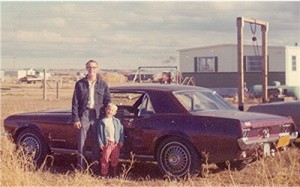 My brother-in-law, Ron Schulenberg has been my brother-in-law for so long that he is really more my brother that brother-in-law. Ron was just 6 years old when Bob and I started dating. We used to take him places with us when most people he knew made him feel like he was in the way. He was too little to do much in the way of chores, and he couldn’t really help his dad work on a car. Everybody just kept telling him to, “Go play.” That is a big bummer for a little guy who just wants to be a part of what he sees as “the fun.”
My brother-in-law, Ron Schulenberg has been my brother-in-law for so long that he is really more my brother that brother-in-law. Ron was just 6 years old when Bob and I started dating. We used to take him places with us when most people he knew made him feel like he was in the way. He was too little to do much in the way of chores, and he couldn’t really help his dad work on a car. Everybody just kept telling him to, “Go play.” That is a big bummer for a little guy who just wants to be a part of what he sees as “the fun.”
While Ron gets to “play” with the big kids these days, his idea of “fun” 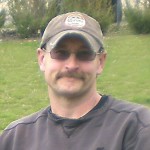 hasn’t changed one bit. He still wants to play with the big toys. These days, as a mechanic, Ron can work on anything from a car to heavy equipment. He probably knows more about the equipment he works on that his dad ever did. His dad was an excellent mechanic too, but so much has changed over the years, and mechanics is no different. Computers have changed everything about how we work on things, In fact, some things won’t even tell us what is wrong without a computer. As these technological changes come into play, mechanics have to change with them. The problem for the older mechanics is that they are used to the old ways, or they have retired, and don’t have access to new technology. Then their own car needs work, and the don’t have the technology. Enter the younger guys.
hasn’t changed one bit. He still wants to play with the big toys. These days, as a mechanic, Ron can work on anything from a car to heavy equipment. He probably knows more about the equipment he works on that his dad ever did. His dad was an excellent mechanic too, but so much has changed over the years, and mechanics is no different. Computers have changed everything about how we work on things, In fact, some things won’t even tell us what is wrong without a computer. As these technological changes come into play, mechanics have to change with them. The problem for the older mechanics is that they are used to the old ways, or they have retired, and don’t have access to new technology. Then their own car needs work, and the don’t have the technology. Enter the younger guys.
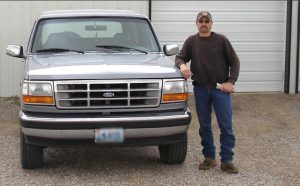
Suddenly, it’s Ron who knows how to work on the new stuff. I suppose he could have told his dad and big brother to “go play,” but that wouldn’t be his style. Maybe because he knew how it felt, or more likely because he understands that there is a time to play with the big boys, and a time to wait your turn. For Ron I’m sure he knew that the time would come when he would be the one with the much needed knowledge. The other men would need to come to him for help. Yes, he could rub it in, but he didn’t. He is the go-to guy, and he is ready to help when he is asked. Today is Ron’s birthday. Happy birthday Ron!! Have a great day!! We love you!!
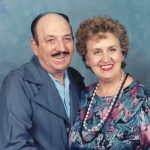
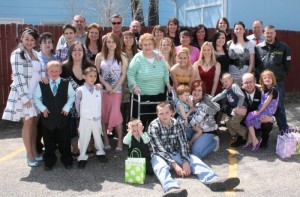 Five years is such a long time, and yet such a short time. I simply can’t believe that my mom has been in Heaven that long. The day she left us is still vivid in my memory files. It is a picture I will never get out of my head. There are a few scenes in my head that are that way. I try not to focus on them. They don’t need to be re-run to keep their memory alive. I try to focus on the happier past…the memories of the good times with my mom.
Five years is such a long time, and yet such a short time. I simply can’t believe that my mom has been in Heaven that long. The day she left us is still vivid in my memory files. It is a picture I will never get out of my head. There are a few scenes in my head that are that way. I try not to focus on them. They don’t need to be re-run to keep their memory alive. I try to focus on the happier past…the memories of the good times with my mom.
Collene Spencer was a bit of a shy girl, but she knew a good looking man when she saw one. For her, falling in love with my dad was like breathing…and she never looked back. Mom didn’t really like school, so that was not something that had any hold on her. She wanted to be married and have a family. I don’t really know if that had been her dream, before she met my dad, but it certainly was after that meeting. Their honeymoon was a move East to Superior, Wisconsin where Dad’s family was from and still lived. Mom’s family liked the idea too, because it gave them someplace to go visit. It was a beautiful place to visit too, so that was a plus. While mom eventually wanted to and did move back, her family wished she had stayed, so they could justify more visits.
After having their first two daughters, Cheryl Masterson, and me in Superior, Mom and Dad had the rest, Caryl Reed, Alena Stevens, and Allyn Hadlock here in Casper, Wyoming, where Mom’s family mostly lives. I have always thought we were very blessed to have so much family around us. That has never really been made so clear as when we became orphans. That’s when family really means a lot. My sisters, and our families first and foremost, of course, but aunts, uncles, and especially cousins have stepped in too…making us feel loved and comforted. I will always miss my parents…until the day I join them in Heaven. They taught us so many things, 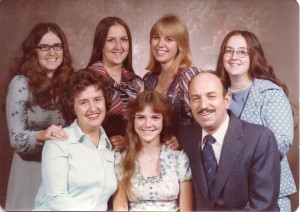
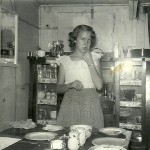 and it is because of their upbringing that we are the women we are today. The best we can do is make them proud of the people their children have become. I can’t believe that my mom has been in Heaven for five long years now. It seems an impossible number of years. While it seems just seconds ago to those who are there, mostly because that’s how eternity works, for the rest of us, the days feel much longer. We love and miss you Mom, and we can’t wait to see you again.
and it is because of their upbringing that we are the women we are today. The best we can do is make them proud of the people their children have become. I can’t believe that my mom has been in Heaven for five long years now. It seems an impossible number of years. While it seems just seconds ago to those who are there, mostly because that’s how eternity works, for the rest of us, the days feel much longer. We love and miss you Mom, and we can’t wait to see you again.
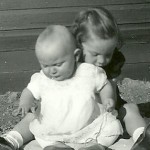
 My sister-in-law, Debbie Cook is my husband, Bob Schulenberg’s older sister. She was born just 16 months before my husband. Debbie’s birth followed a developmentally disabled older sister, and a miscarriage. Debbie’s own birth was not an easy situation either. She was born very, very premature, and only weighed a little over 2 pounds. When she finally came home from the hospital, she could have used a shoe box for a crib. Still, her life from that point forward, has been picture perfect.
My sister-in-law, Debbie Cook is my husband, Bob Schulenberg’s older sister. She was born just 16 months before my husband. Debbie’s birth followed a developmentally disabled older sister, and a miscarriage. Debbie’s own birth was not an easy situation either. She was born very, very premature, and only weighed a little over 2 pounds. When she finally came home from the hospital, she could have used a shoe box for a crib. Still, her life from that point forward, has been picture perfect.
With so much going wrong before and during her life’s beginning, one would expect that her whole life would have been much more tragic, and I suppose it could have been. These days great strides have been made in the area of preemie care. Often these babies started out behind, and stayed behind their whole lives. Now, the medical professionals understand that preemies have some special needs, care can be given to make preemie’s early days more productive. The thing about Debbie’s start is that she wasn’t born “these days.” Debbie was born back in the day when little was known of the needs of a preemie. That makes her prognosis more grave, and her outcome more miraculous. Debbie came out of her humble beginnings, without a “scratch” of a learning disability. I would have to call this one a miracle…plain and simple.
Debbie’s life has been one with relatively few health problems in it, and without learning disabilities, so considering the year of her beginning, things could have been much worse. Many babies born so prematurely 
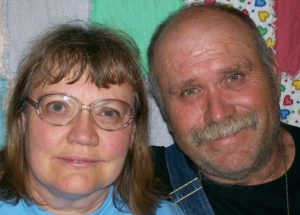 don’t survive…even these days. The outcome could have been very different…tragically different. Debbie’s life turned out good. It was not perfect. She lost a daughter of her own, but she had two healthy daughters, and 4 grandchildren. She and her husband, LJ are retired now, and love to go camping in the Big Horn Mountains as often as they can. I’m glad things in her life went the way they did, for the most part. Today is Debbie’s birthday. Happy birthday Debbie!! Have a great day!! We love you!!
don’t survive…even these days. The outcome could have been very different…tragically different. Debbie’s life turned out good. It was not perfect. She lost a daughter of her own, but she had two healthy daughters, and 4 grandchildren. She and her husband, LJ are retired now, and love to go camping in the Big Horn Mountains as often as they can. I’m glad things in her life went the way they did, for the most part. Today is Debbie’s birthday. Happy birthday Debbie!! Have a great day!! We love you!!
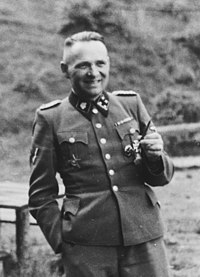 As a grandmother and great grandmother, I want my grandchildren to love me and want me around, but even more that that, I want my grandchildren to respect me, because when it comes down to it, your good name is really the best thing to pass down to your kids, whether they take your last name or not. Your name is your identity, oh sure, you can change it, but once you have ruined your reputation, not much can fix it.
As a grandmother and great grandmother, I want my grandchildren to love me and want me around, but even more that that, I want my grandchildren to respect me, because when it comes down to it, your good name is really the best thing to pass down to your kids, whether they take your last name or not. Your name is your identity, oh sure, you can change it, but once you have ruined your reputation, not much can fix it.
As a prime example, take the case of Rainer Höss. The name might not ring any bells to you, and mostly that would be due to the fact that the English pronunciation of the name, doesn’t really tell you what the name is. Rainer Höss is the grandson of the former commandant of Auschwitz, Rudolph Höss, and he knows first-hand how bad it can be when your name has been ruined.
In 1933, Rudolph Höss joined the SS in Nazi Germany, and in 1934 he was attached to the SS at Dachau. On August 1, 1938, Rudolph Höss was appointed as adjutant of the Sachsenhausen concentration camp until his appointment as Kommandant of the newly-built camp at Auschwitz in early 1940. In May 1941, SS commander Heinrich Himmler told Höss that Hitler had given orders for the final solution of the Jewish question and that “I have chosen the Auschwitz camp for this purpose.” It was then that Höss converted Auschwitz into an extermination camp and installed gas chambers and crematoria that were capable of killing 2,000 people every hour. He was brutally meticulous…counting corpses with the cool dedication of a trained bookkeeper, he went home each night to the loving embrace of his own family who lived on the camp grounds. Rudolph Höss had no qualms about watching millions of innocent human beings dissolve in the gas chambers, burn in the crematoriums and their teeth melt into gold bars, Höss even wrote poetry about the “beauty” of Auschwitz. He was a monster of epic proportions.
Nazi leader Adolf Eichmann recounted in his memoirs how he was assigned in early 1942 to visit the Auschwitz death camp and report back to superiors on the killing of Jews. He wrote that the methods for killing were still crude, but these represented a gruesome foretaste of the factory-style gas chambers and crematoria that were to follow: “Höss, the Kommandant, told me that he used sulfuric acid to kill. Round cotton wool filters were soaked with this poison and thrown into the rooms where the Jews were assembled. The poison was instantly fatal. He burned the corpses on an iron grill, in the open air. He led me to a shallow ditch where a large number of corpses had just been burned.”
Höss eventually found that gassing by carbon monoxide was inefficient and introduced the cyanide gas Zyklon B. He later recalled: “The gassing was carried out in the detention cells of Block 11. Protected by a gas mask, I watched the killing myself. In the crowded cells, death came instantaneously the moment the Zyklon B was thrown in. A short, almost smothered cry, and it was all over…I must even admit that this gassing set my mind at rest, for the mass extermination of the Jews was to start soon, and at that time neither Eichmann nor I was certain as to how these mass killings were to be carried out. It would be by gas, but we did not know which gas and how it was to be used. Now we had the gas, and we had established a procedure.” Rudolph Höss not only “enjoyed” his work, but he was proud of his accomplishments.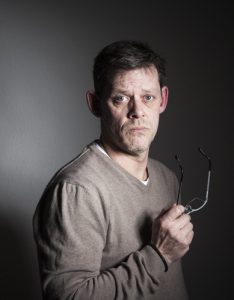
His family, or at least his grandson Ranier Höss was horrified by the legacy his grandfather so “lovingly” left him. He could not believe that his grandfather was not only proud of what he had done, but he liked it so much that he wanted to watch from inside the chamber. Rainer Höss has spent his whole life trying to escape the stigma of being related to Rudolph Höss. Rainer doesn’t expect to be forgiven…he knows that he will always be blamed for what his grandfather did, because his grandfather left him the name. His grandfather was proud his “accomplishments.” He honestly thought everyone would be proud. He honestly thought he was a hero.
Rainer Höss doesn’t expect to be “forgiven.” He knows it wasn’t his fault, but he understands the reasons people react the way they do, because it’s how he would react. That is the real legacy his “grandfather” left him. You see, for Rainer Höss…grandfather is an abstract word.
 In 1980, the United States started a national clean-up program called Adopt-A-Highway. I’m sure we have all seen the signs along the highway, although these days we are so used to them, that it’s easy to miss them, if we aren’t paying attention. Littering was a big problem when I was growing up. I recall everyone tossing trash out the window, while driving down the highway. Then a man, by the name of James Evans, an engineer for the Texas Department of Transportation (TxDOT), saw debris flying out of a pickup truck bed. Litter cleanup by the city was expensive, so Evans sought the help of local groups to sponsor the cleaning of sections of the highway. In addition, the efforts of Billy Black, a TxDOT public information officer, led to quarterly cleanup cycles, volunteer safety training, the issuing of reflective vests and equipment, and the posting of adopt-a-highway signs.
In 1980, the United States started a national clean-up program called Adopt-A-Highway. I’m sure we have all seen the signs along the highway, although these days we are so used to them, that it’s easy to miss them, if we aren’t paying attention. Littering was a big problem when I was growing up. I recall everyone tossing trash out the window, while driving down the highway. Then a man, by the name of James Evans, an engineer for the Texas Department of Transportation (TxDOT), saw debris flying out of a pickup truck bed. Litter cleanup by the city was expensive, so Evans sought the help of local groups to sponsor the cleaning of sections of the highway. In addition, the efforts of Billy Black, a TxDOT public information officer, led to quarterly cleanup cycles, volunteer safety training, the issuing of reflective vests and equipment, and the posting of adopt-a-highway signs.
Like any new idea, the Adopt-A-Highway program took a while to kick off. but in 1985, the Tyler Civitan Club became the first group to volunteer, adopting by two miles along US Route 69 just north of Loop 323 between Tyler and Interstate 20. It was the kick start the program needed. The program proved to be very successful and has since spread to 49 states, Puerto Rico, Canada, New Zealand, Australia, and Japan. Vermont has a similar program called “Green Up.”
Some states, such as Nevada, allow both Adopt-a-Highway and Sponsor-a-Highway programs. In both programs, an organization that contributes to the cleanup is allowed to post its name. That is where the similarity ends, however. While an adopting organization provides the volunteers who do the litter pickup, a sponsoring organization instead pays professional contractors to do the work. Safety concerns, make the latter more typical in highways with high traffic volumes.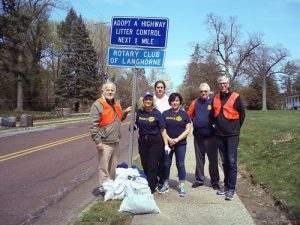
There have been some controversies, such as when the KKK wanted to join. People were against it and some anger was stirred up. The Adopt-A-Highway program allows any organization to participate, which became a point of controversy when the Ku Klux Klan adopted a portion of Interstate 55 just south of St. Louis, Missouri. While legally the program had to uphold the groups’ rights to participate, public outcry and repeated destruction of its sign was a cause of concern. In November 2000, the section of highway was designated as the Rosa Parks Freeway after the famous civil rights figure. It was then that the problem began to work itself out. The KKK sponsorship was later dropped from the program for the group’s failure to fulfill its obligations, and the Missouri Department of Transportation adopted specific criteria to prohibit hate groups from future participation. However, the 8th Circuit Court of Appeals ruled that any attempt to bar the Klan from participation in the Adopt-a-Highway program on the basis of the group’s purpose is a violation of the First Amendment. The Supreme Court declined to hear the case, so the ruling stood.
In January 2005, the American Nazi Party adopted a stretch of the rural Sunnyview Road NE outside Salem, Oregon. Two signs were put up along the road that bore the names of the American Nazi Party and NSM. The signs, which cost $500 and were almost immediately subject to vandalism, have since been removed. The American Nazi Party’s chair, Rocky J. Suhayda, claimed to have no association with the Adopt a Highway program. In 2009, the state of Missouri renamed a section of highway after Rabbi Abraham Joshua Heschel, because it had been adopted by a neo-Nazi group. Rabbi Heschel fled the Nazis’ advance in Europe and became a 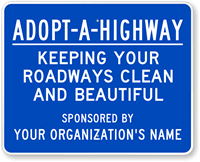 prominent theologian and civil rights advocate in the United States before his death in 1972. Rabbi Heschel’s daughter opposed this decision.
prominent theologian and civil rights advocate in the United States before his death in 1972. Rabbi Heschel’s daughter opposed this decision.
To me it seems that caring for the earth, and hate groups just don’t go together. I don’t understand why a law can’t be made, to stop hate groups from participation in this or anything else that is service oriented. I think that any group that joins to exploit the sensational aspect of things should be able to be banned, but that is my opinion. Economically, the program may be viewed as a way of getting around regulations prohibiting billboards next to a highway and on a per-view basis. Still, it is more economical than billboards.

